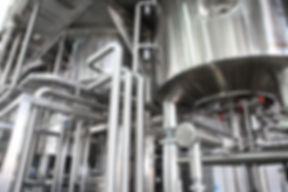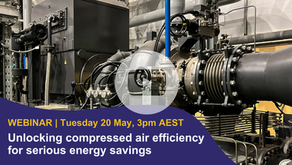
Analysis by A2EP reveals that compressed air systems account for around 16% of electricity use at typical manufacturing sites, and that 80-90% of the energy used by compressed air systems is wasted. We have recently published two reports and presented an industry briefing about these issues and the scope for improvement.
Inefficiency of compressed air systems is common, with contributing factors including a leaks, lack of monitoring, organisational issues preventing action and a lack of awareness of alternatives.

COMPRESSED AIR EFFICIENCY & ALTERNATIVES
A2EP was engaged by the NSW Department of Planning, Industry and Environment (NSW DPIE) to investigate the extent, causes and potential solutions for compressed air inefficiency in manufacturing. Our work also included investigating alternatives to using compressed air which offer other business benefits in addition to energy savings.
Compressed air waste in manufacturing
A2EP recently completed an analysis of the compressed air offer delivered to NSW manufacturers by NSW DPIE. The analysis revealed that compressed air inefficiency is widespread and results in significant energy waste. The energy costs for compressed air systems were shown to be ten times that of maintenance over the lifetime of systems.
The report details common obstacles to tackling compressed air efficiency, potential pathways for improving compressed air efficiency at the business and industry levels, as well as emerging alternatives to using compressed air.
WEBINAR | 20 May: Unlocking compressed air efficiency for serious energy savings
Compressed air is essential - but it's also expensive. Are you getting the most from your system? Your compressed air system could be your best untapped source of energy savings. Learn from our experts the simple ways you can achieve some impressive energy, cost and emissions savings.
Alternatives to compressed air
NSW DPIE engaged A2EP to research and review efficiency opportunities for compressed air system use, including emerging technologies and current alternatives.
Prepared by Alan Pears and Liz Hutton, the report was published in August 2020 and noted the significant potential for energy savings and productivity improvements from implementing alternatives. It also highlighted a number of non-energy related additional benefits that may come from implementing more efficient and alternative technologies.
The report presented findings from other research as well as from international and Australian case studies across a variety of compressed air applications, including robot grippers, wastewater treatment, air knives, sugar processing, car manufacturing and blower-driven air.
With technologies and industrial process requirements changing quickly, draws attention to the opportunities for developing new business models that support proper consideration and implementation of alternatives to traditional CAS.
Related information
-
Compressed air systems - NSW Department of Planning and Environment
-
Reduce compressed air costs in your business - Sustainability Victoria











